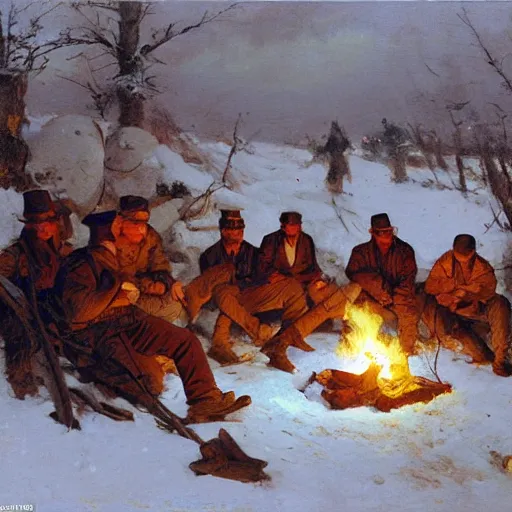
To listen to today’s reflection as a podcast, click here
For just one evening, the horrors of the Civil War gave way to something beautiful.
On a December night in 1862, Union and Confederate troops were encamped on opposite banks of the Rappahannock River in Virginia.
The battle of Fredericksburg had raged just a few days earlier. The Yankees, in particular, had taken an indescribable beating. The troops on both sides sat around their campfires, fully aware that enemy combatants were just across the water – close enough that they could occasionally hear each other’s conversations.
Music was an essential component of Civil War fighting units. Musicians could provide both comfort and inspiration. That evening, one of the camp bands began to play.
The other band, the one across the river, answered with a song of its own. The Federal musicians eventually cranked up “Yankee Doodle.” The Rebs replied with “Dixie.”
The soldiers listened, amused and entertained. It was a battle of a different kind. Not an exchange of gunfire, but a battle of the bands.
Then one of the musicians struck up a melody everyone knew. The band across the river joined in. No diaries record which side was first to sound the notes of “Home, Sweet Home.” But in a matter of moments, two encampments that a few days later would resume the task of trying to kill each other were joined together in an overwhelming longing for home.
“Home, Sweet Home” arrived on the American scene in 1823. It soared in popularity on both sides of the Mason-Dixon Line. Its words are familiar to most of us even two centuries later:
Mid pleasures and palaces we may roam
Be it ever so humble, there’s no place like home
If we haven’t actually sung the tune at one time or another, we at least know that the last five words were meaningful to a certain young lady from Kansas as she tapped her ruby slippers.
That chilly evening in Virginia, men on both sides wept. One soldier later wrote that there wasn’t a dry eye in his company’s ranks.
The song effected a kind of momentary truce. Fighting men were transformed into homesick sons, brothers, and fathers. It’s telling that during the second half of the war, Union bands were forbidden to play it, lest soldiers be tempted to walk away from their posts and head for home.
The ancient Greeks knew about this deep yearning. They called it nostos, “an overwhelming desire to return home” – to find oneself in a place where everything, at last, is just as it should be.
In 1688, a young Swiss medical student named Johannes Hofer coined a word to describe the melancholy feelings experienced by soldiers spending day after grueling day far from the comforts of their fireplaces and kitchens.
By combining nostos (“homecoming”) with the Greek word algos (“pain” or “ache”), Hofer came up with the word “nostalgia” – an almost physical ache to go home, or to go back to a happier past, or perhaps to go forward to reclaim something priceless that has somehow been lost.
The author of the book of Hebrews, after identifying a host of men and women who placed their trust in a God they could not see, wrote this:
“Each one of these people of faith died not yet having in hand what was promised, but still believing. How did they do it? They saw it way off in the distance, waved their greeting, and accepted the fact that they were transients in this world. People who live this way make it plain that they are looking for their true home. If they were homesick for the old country, they could have gone back any time they wanted. But they were after a far better country than that—heaven country. You can see why God is so proud of them, and has a City waiting for them” (Hebrews 11:13-16, The Message).
People yearn for a world in which everything broken can finally been redeemed or repaired – when soldiers can lay down their guns and share mutual hope and love.
Our yearning for heaven is a nostalgia for our true spiritual home – the new heavens and new earth that God is even now preparing for his people.
Which means no matter what our circumstances today, we can be the first to join in that well-worn song:
“There’s no place like home.”
